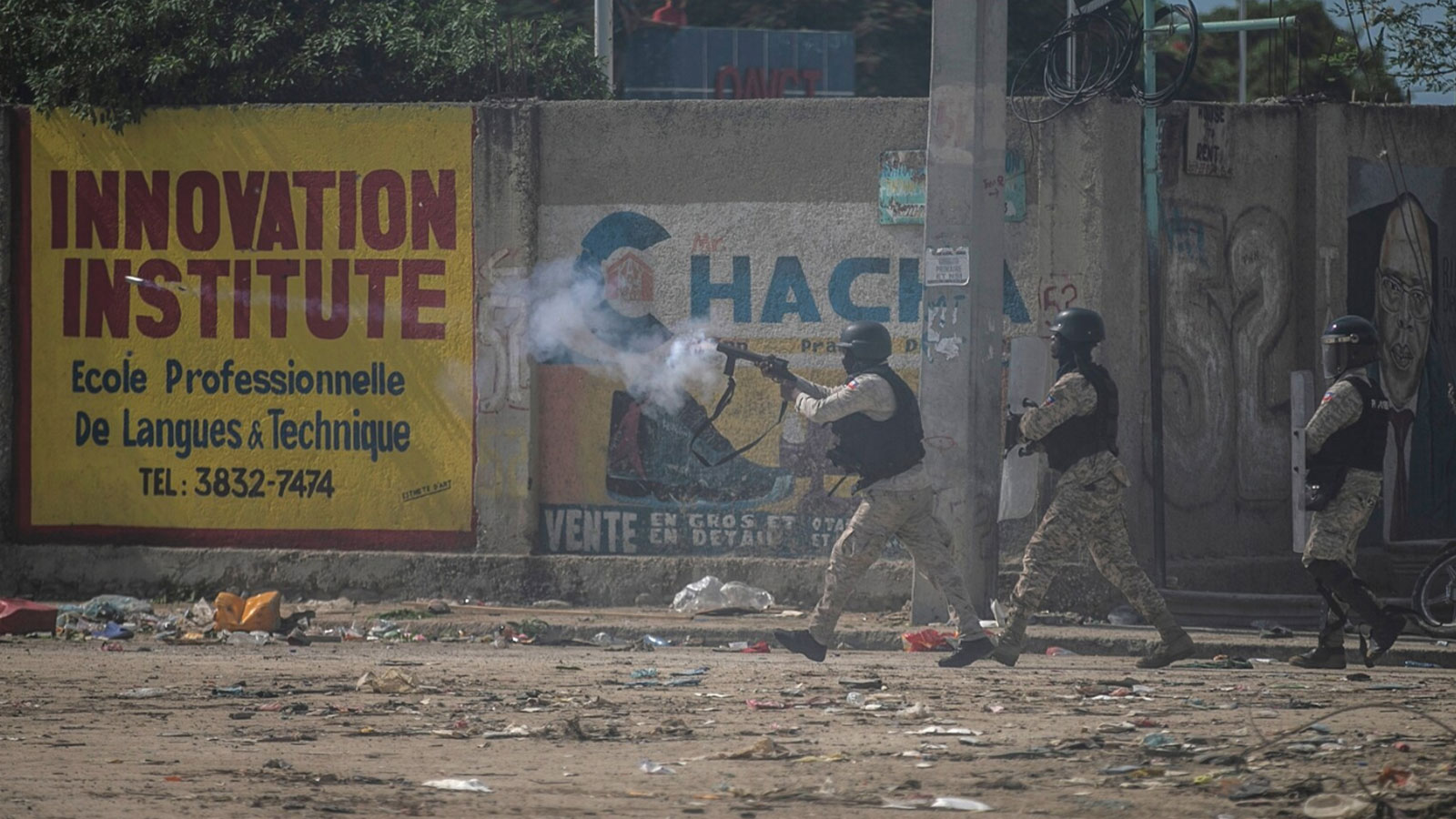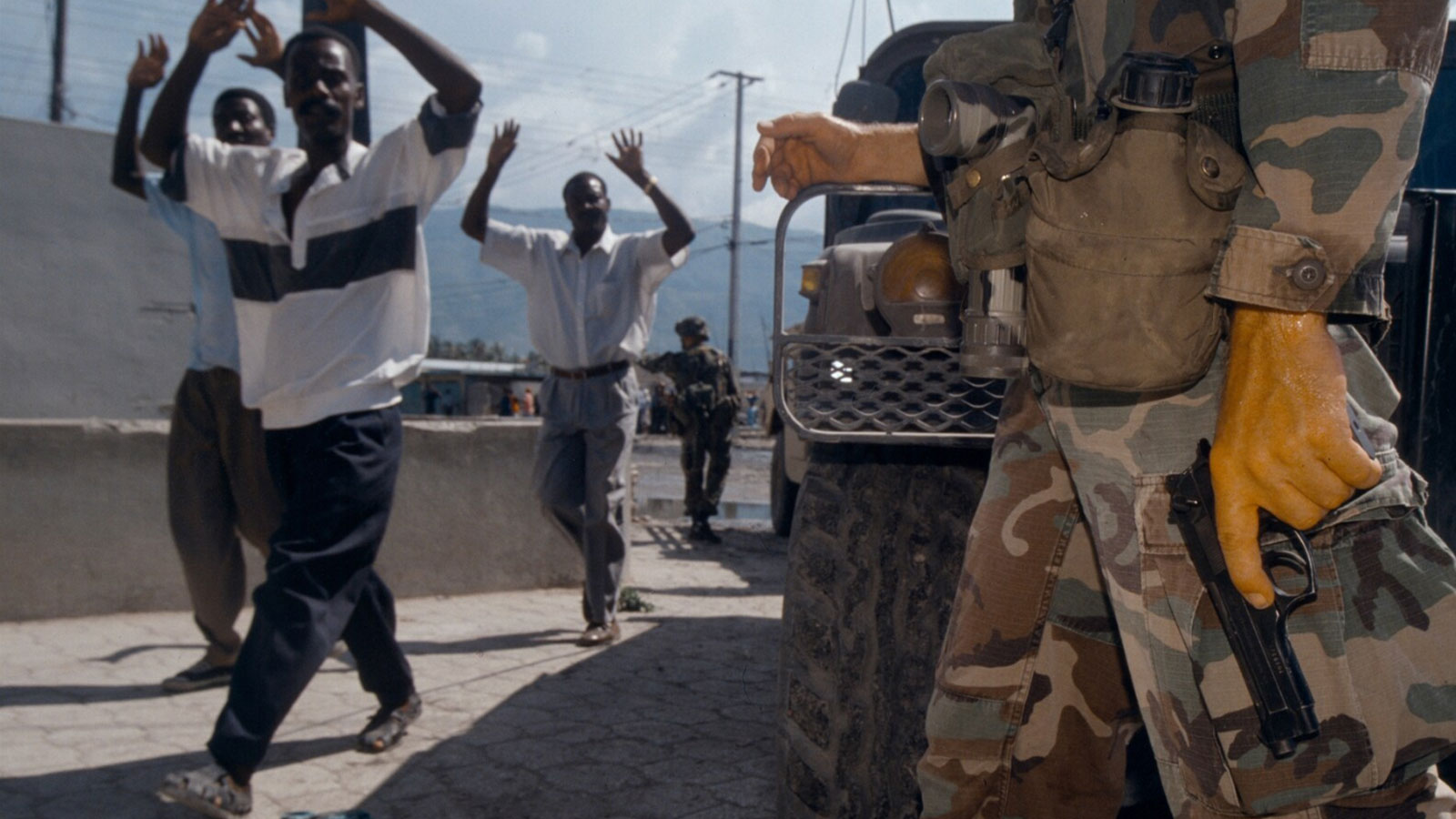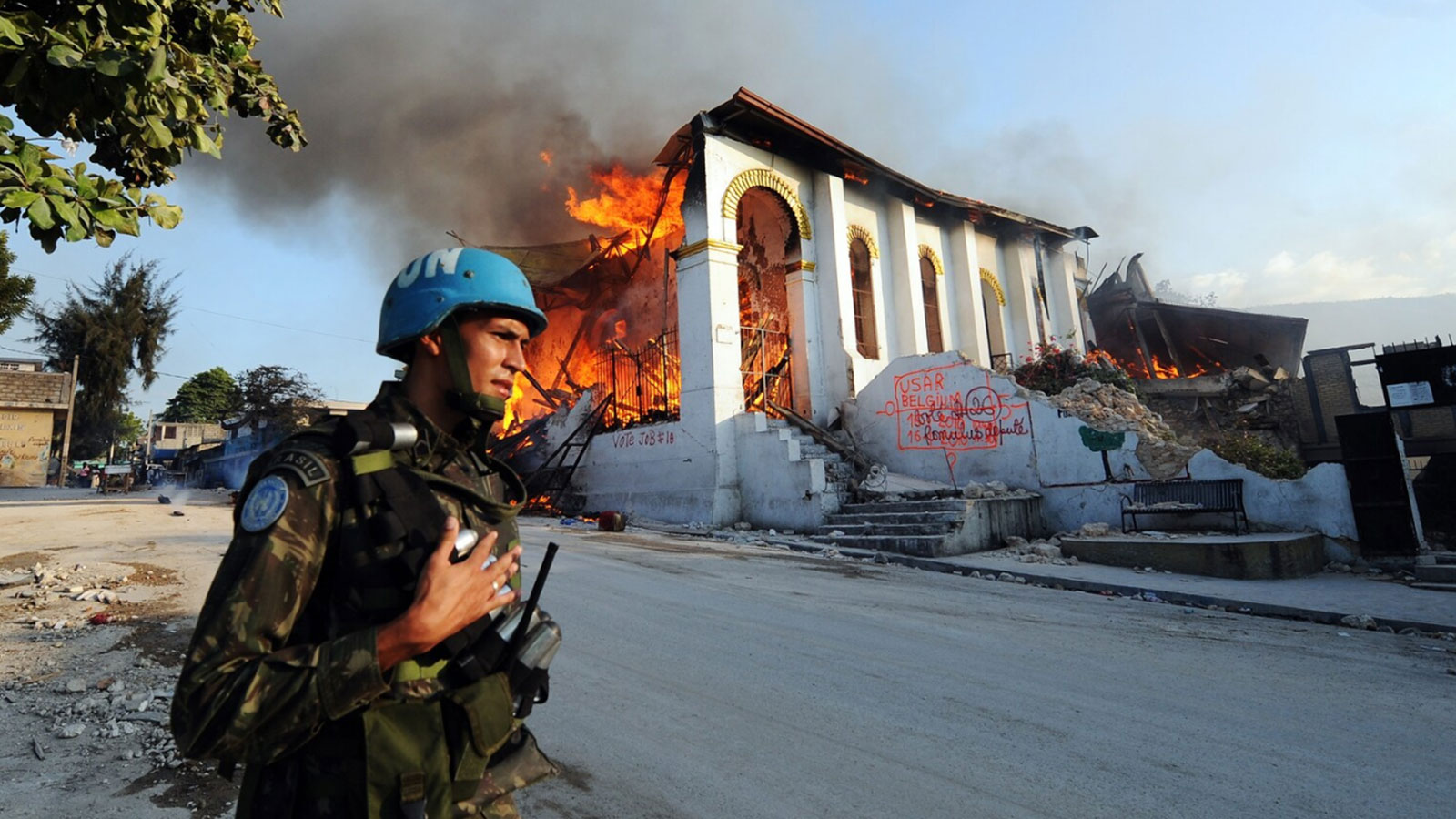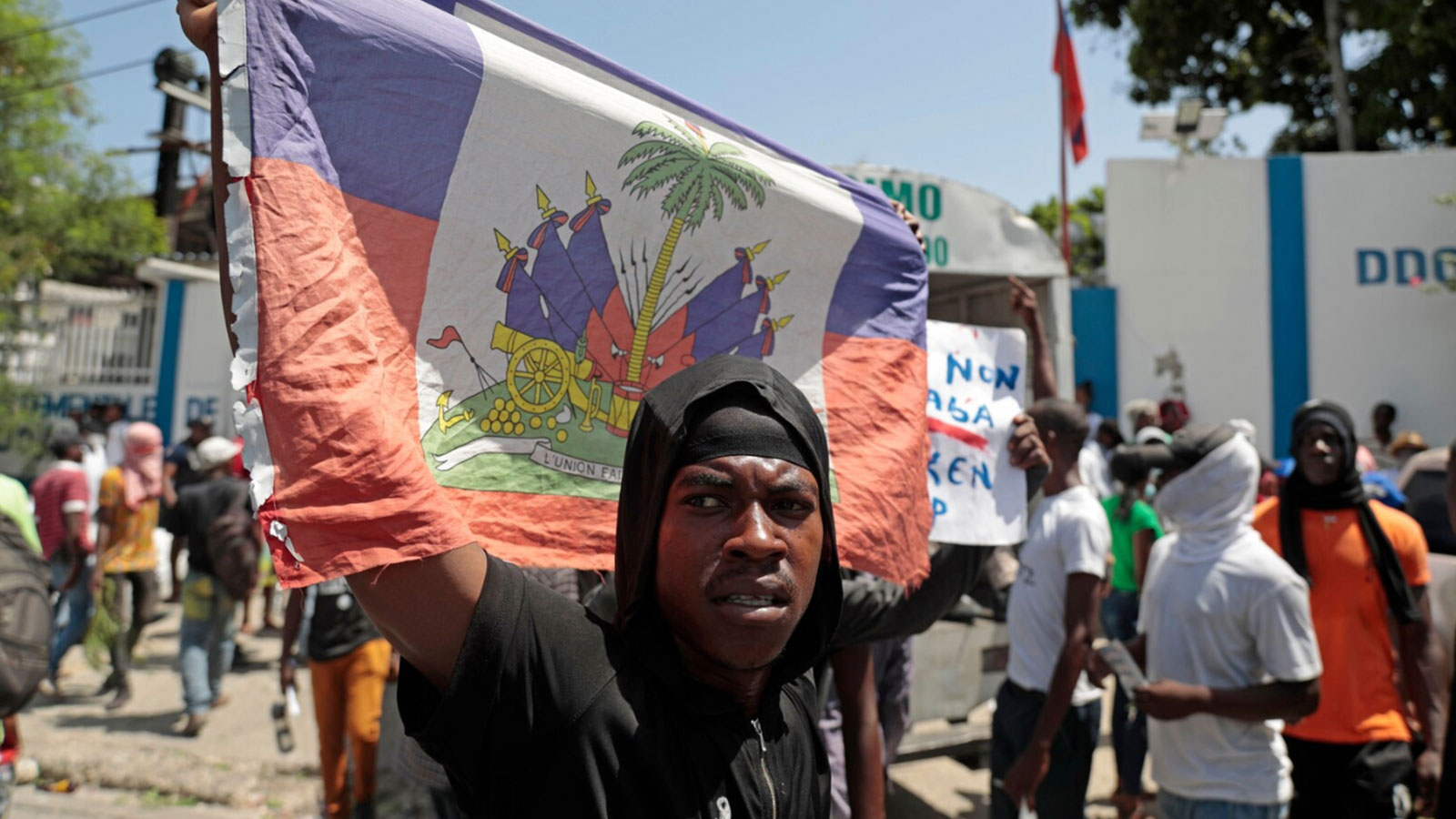A painful history of destabilizing interventions looms over international efforts to pull together a security force.
By Widlore Mérancourt and Amanda Coletta, Washington Post —
Antonio Saint Louis lives in constant fear. A housekeeper in Haiti’s capital, he says bandits killed a friend’s brother weeks ago as they laid unrelenting siege to the sprawling Carrefour-Feuilles slum.
Saint Louis, 34, fears an invasion of his own community is inevitable. He has little faith that Prime Minister Ariel Henry — unelected and unloved — or the Haitian police — outmatched and outnumbered by gangs — can restore order on their own.
“A [foreign] intervention would not be the ideal course of action,” he told The Washington Post. “But to suppress the gangs and stabilize the country, we don’t have any other choice.”
It’s been almost a year since Henry appealed to the international community for a “specialized armed force” to bring stability to a country asphyxiated by gang violence and interlinked humanitarian crises.
Now, after several countries declined to lead such a force, Kenya has said it’s considering taking the helm, and diplomats this month are drafting a resolution to present to the U.N. Security Council. But as officials negotiate details, there remain debates about which countries should staff it and what it should do, as well as concerns that it not repeat the mistakes of interventions past.

A police officer in Port-au-Prince fires tear gas during a demonstration on Oct. 17, 2022, to reject the international security force requested by Prime Minister Ariel Henry and demand his resignation. (Odelyn Joseph/AP)
The U.N. mission from 2004 to 2017 achieved mixed results against Haiti’s armed gangs. The military component of the mission, led by Brazil with troops from more than 20 countries, is remembered largely for alleged rights abuses, sexual assaults and a cholera outbreak that killed more than 10,000 people, poisoning Haitian trust in the institution.
A difference between 2004 and now? Gangs today “have more guns, more power, more money and access to technology,” said Gédéon Jean, director of the Center for Analysis and Research in Human Rights in Port-au-Prince.
“They are not simple groups,” he said, and the mission that’s been proposed “is not sufficient” to beat them.
Gang violence has spiraled since the still-unsolved assassination of President Jovenel Moïse in 2021. Criminals control vast swaths of the capital and are gaining a foothold in the countryside, where they have unleashed campaigns of kidnapping, rape and murder of ordinary people.
U.N. Secretary General António Guterres told the Security Council last month that conditions were not conducive to a U.N. peacekeeping mission. What’s required, he wrote, are “police special forces and military support units” to neutralize gangs and restore order.
“Nothing short of the robust use of force, complemented by a suite of non-kinetic measures, by a capable specialized multinational force enabled by military assets, coordinated with the national police, would be able to achieve these objectives,” Guterres wrote.
The United States backed Henry’s call for an international force and is helping to draft the U.N. resolution. But White House national security adviser Jake Sullivan told reporters this month that it’s not contemplating a military mission.
“What we’re looking to do is to support a multinational force that is fundamentally a policing support mission, not a military mission,” he said, “and one that is in support of the Haitian national police, not taking over the sovereign policing capacities from the Haitian national police.”
U.S. officials have pledged “significant” financial backing for the force. Kenya has said it’s considering a commitment of 1,000 police officers. Several Caribbean nations have indicated an openness to contributing hundreds of personnel. Officials plan to hold a meeting on the side of the U.N. General Assembly this week to discuss what contributions countries might make.
That pales in comparison to the size of past interventions, said Keith Mines, director of the Latin America program at the U.S. Institute of Peace. He estimates a mission with 10,000 personnel is probably necessary.
“There’s a danger that’s always looming that if the forces aren’t large enough, if they’re not robust enough, that makes everything harder,” he said. “They wouldn’t have the ability to establish up front that intimidating presence that would be needed to push back the gangs and reestablish security.”

U.S. troops try to keep order after a deadly grenade attack by right-wing forces on a democracy march to support ousted president Jean-Bertrand Aristide on Sept. 29, 1994, in Port-au-Prince. (Andrew Lichtenstein/Corbis/Getty Images)
A State Department official said last month that the force would “secure critical infrastructure sites” so the police could focus on fighting the gangs. That idea has drawn criticism in Haiti.
“The first priority is to protect the population,” Jean said. “That means stopping the progression of the gangs and conducting operations against the gangs. People think it’s a joke, that the international community isn’t serious when this option of protecting infrastructure is mentioned.”
Clifordson Desir was forced from his home in Carrefour-Feuilles by the attacks. After spending nights on the street, sleeping in the rain, the electrician and his wife fled to the comparatively calm city of Jérémie in Haiti’s southwest.
“We asked for help from the army and the police,” said Desir, 43, “but we are on our own. I’ve heard that Kenya is coming to secure the state’s institutions and the government, but I haven’t heard anything about help for the people.”
Many fear an intervention will serve mainly to prop up Henry, an appointed prime minister whom they see as illegitimate. The presidency has been vacant since Moïse was killed in his home in July 2021, and legislators’ terms have all expired, but progress toward elections has been slow. The United States and others have called on Henry and other political leaders to reach a deal on a way forward, but efforts by Caribbean leaders this month to break the impasse were unsuccessful.

A U.N. soldier from Brazil secures an area near a burning church that collapsed during the Port-au-Prince earthquake on Jan. 18, 2010. (Jewel Samad/AFP/Getty Images)
The United States, which wants a security force in Haiti but has declined from the beginning to lead it, has struggled to persuade others to take the job. Efforts to push Canada to take the helm failed.
Henry, meanwhile, has grown “frustrated” by the “slow” pace of the response to his call and doubted a force would ever materialize, analysts wrote in a classified U.S. intelligence document obtained by The Washington Post. The document is not dated, but it references events as recent as March.
Several countries have said they were willing to support the force, but the unnamed writers of the intelligence report, which contains secret and top secret markings, said they “very likely lack the personnel and logistic capabilities to deploy a viable force without U.S. assistance.”
The writers of the document, which was shared on the Discord messaging platform, allegedly by a member of the Air National Guard, said Henry preferred U.S. assistance, but had determined it was “necessary to resume talks with partner nations to ensure timely assistance.”
Still, they added, Caribbean militaries have “limited resources — even if combined — to form a viable regional crisis mission.”
A spokesman for Henry did not respond to a request for comment.
The report features a top-secret table that lists several countries and whether they might contribute. Kenya is not one of them.
The long history of destabilizing foreign interventions in Haiti has loomed over the current effort. Brazil, the analysts said, felt its previous participation was “unpopular,” and Chile thought past interventions “did not produce results.”
Brazil’s Foreign Ministry called the document’s characterization “a misrepresentation” of the Brazilian position on the U.N. mission and said the country “maintains open dialogue with the international community” about how to improve conditions in Haiti.
“Chile supported and actively participated in the previous U.N. mission in Haiti,” its Foreign Ministry said in a statement. “Our evaluation is positive. Today the circumstances are different, therefore the mandate and composition of a new mission require other standards.”
The Pentagon did not respond to a request for comment. The State Department said it “doesn’t comment on the authenticity or veracity of allegedly leaked documents.”
“As we and other countries have said publicly, we recognize Haiti’s request for urgent assistance due to the dire security situation,” a spokesperson said. “The international community continues consultations on a multinational support mission, composed of a variety of organizations and countries contributing their areas of expertise.”
Kenya has experience participating in international deployments, and the country has cast a Haiti mission as aligning with its “commitment to Pan Africanism.” But its police have drawn their own criticism.
The Nairobi-based Independent Medico-Legal Unit, a civil society group that tracks police killings, reported this month that the Kenyan government had “performed dismally” on democratic policing and protecting human rights.
“In the past year,” the group said, “we have witnessed a wave of punitive policing during protests, extrajudicial executions, deaths in custody, deliberate torture of children, interference with investigative authorities” and other abuses.
Neither Kenya’s foreign minister, spokesmen for its Foreign Ministry, Interior Ministry nor police responded to requests for comment.
Thara Lajoie, deputy coordinator of the Haitian feminist organization Gran Jipon, said previous foreign interventions played a role in the country’s current instability. She opposes an international intervention in part out of concern for the Kenyans’ record of abuse.
“If they can’t respect human rights in their own country, what about us?” she said.
Source: Washington Post
Katharine Houreld in Nairobi and Samantha Schmidt in Bogotá contributed to this report.
Widlore Mérancourt is a Haitian reporter and editor-in-chief of AyiboPost, a renowned online news organization. He has covered major news events in Haiti for The Washington Post, including the 2021 assassination of President Jovenel Moïse.
Amanda Coletta is a Toronto-based correspondent who covers Canada and the Caribbean for The Washington Post. She previously worked in London, first at the Economist and then the Wall Street Journal
Featured image: A demonstrator holds up a Haitian flag at a protest of insecurity in Port-au-Prince on Aug. 7. Armed gangs control large sections of the capital and are spreading into the countryside. (Odelyn Joseph/AP)















